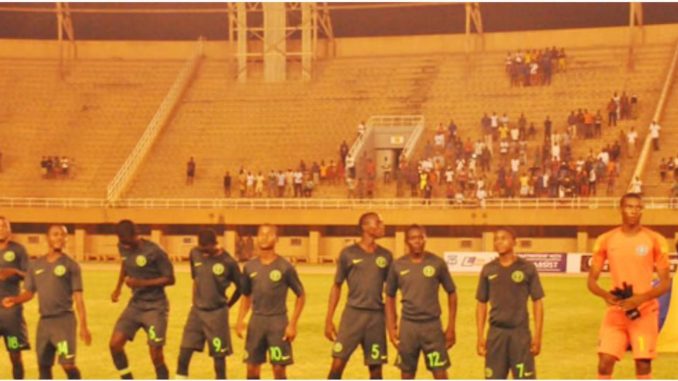
UNLIKE other African countries playing games with age-cheating, the football authorities in Benin Republic have taken a giant step to rid their country of the dubious practice. In a bold move that resonated across the world, a court in Cotonou convicted a group of youth players and a top football administrator for age-cheating and fraud. In a continent struggling with existential challenges, Benin Republic football federation’s example recommends itself to other governing bodies in Africa, especially Nigeria.
In one fell swoop, 10 junior players of the country’s under-17 national team were sentenced to a month-long jail term each a few days ago. They were found culpable of falsifying their ages in last September’s qualifiers for the 2019 (U17) African Cup of Nations in Niger Republic. All the teams were subjected to the Magnetic Resonance Imaging test to determine their true ages. Not for the first time, those players were found out, leaving the organisers no other choice but to expel Benin from the tournament.
Benin’s landmark action did not end there. Anjorin Moucharafou, the Benin FA president at the time of the scandal, was jailed for 12 months. Sadly, the country is accustomed to such scandals. On two occasions, it was the butt of jokes when the International Football Federation suspended it from football activities over cheating in 2004; in 2016, the junior national team was enmeshed in another age scandal. Benin’s current football federation president, Mathurin de Chacus, who spearheaded the cleansing effort, deserves plaudits for his reform.
In contrast to Benin’s repudiation of the win-at-all-cost syndrome, other African football federations are burying their heads in the sand. This is myopic. Nigeria, which has suffered humiliation because of age-cheating in the past, has refused to act. In the late 1980s, FIFA had banned Nigeria from all international football fixtures for two years after finding that the dates of birth of three of the players for its 1988 Olympics squad were different from the ones submitted by the same players in previous tournaments.
It was not an isolated case. In Nigeria, officials habitually collude with the coaches and players to have two different ages – the real age and the “football age.” Just before the 2017 FIFA U17 World Cup, Nigeria suddenly axed 15 squad members from the Golden Eaglets when it learnt that the organisers would subject players to the MRI test. Yet, the federation ignored the wilful practice it is entrenching to the detriment of its future.
A former Golden Eaglets coach, Emmanuel Amuneke, confessed that he was under severe pressure during his tenure over age-cheating. He recalled: “I know what I experienced when I was coaching in the U17s. I was public enemy number one; even the people in the North, a lot of them believe I am an enemy to them. But none have asked the players that did not make it, what really warranted their not making it. Most of these players had serious (age) issues; some even have five passports.”
Scandalously, Nigeria suffered humiliation in 2017 when 23 members of its U17 squad to the AFCON tournament in Rwanda were disqualified after MRI testing. The outcome was that Nigeria failed to qualify for the tournament. This intricate conspiracy is perhaps being sustained by the triumphs of the age-grade teams. Starting with the inaugural contest in 1985 in China, the Golden Eaglets have won five FIFA U17 tournaments, which is the best record globally. The Eaglets and their Flying Eagles (U21) counterparts turn in amazing performances in these international tournaments on a regular basis, making pundits to believe Nigeria is a football giant.
That it is not is perhaps because of the prevalent age falsification culture in the sport. After the FIFA U17 World Cup in Canada in 1987, in which the Eaglets came second behind Russia, top European clubs snapped up some of the Nigerian stars in the tournament. To their consternation, these players drifted out of the game. Essentially, Nigerian players, who shine brightly in these under-age competitions, largely because they are pitted against their juniors, fail to make the grades in Europe. Thus, Nigeria wallows in its ephemeral victory, because, eventually, these players fade out of the limelight at a time they should have moved up to the Super Eagles and be earning mega bucks in top European football clubs. How depressing!
However, countries that build their football on sound tenets are reaping the rewards. In 2009, when Nigeria hosted the FIFA U17 World Cup, Neymar, Casemiro, Philippe Coutinho and goalkeeper Alisson Becker, represented Brazil. They were all at the 2018 FIFA World Cup in Russia with Brazil. All of them currently play for top clubs in Europe, with Neymar of Paris Saint Germain emerging the costliest player in the world following his move to France from Spain in 2017 for £199.8 million. But the best legs from Nigeria’s 2009 team are struggling at unrecognisable clubs in Europe or are back at home after failing to find their feet.
Although Nigeria won the tournament in 2007 in Korea, most of the players who won the laurel then, are nowhere to be found today; conversely, Toni Kroos, the Golden Ball winner, is still playing at the highest level with Real Madrid of Spain, after winning the World Cup with Germany in 2014. This ought to force a rethink here.
To maximise the benefits of age-grade football, the Nigeria Football Federation and the government should crack down on age-cheats. This means that whenever Nigerians are cited for age-cheating, all those involved must get the kind of treatment Benin visited on its contingent to Niger Republic. In a country where corruption is high and birth certificates are not worth the paper they are printed on, the NFF can engineer a paradigm shift through punishment. The Nigeria Immigration Service must implement fool-proof technology to prevent anyone from acquiring multiple passports.
END

Be the first to comment